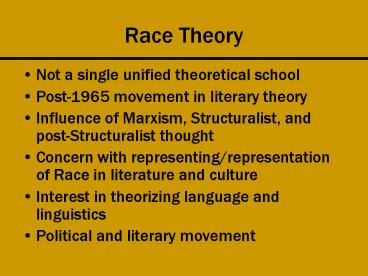Race Theory - PowerPoint PPT Presentation
1 / 16
Title:
Race Theory
Description:
Henry Louis Gates, Jr. (b. 1950) Important African-American critic and spokesman ... Henry Louis Gates, Jr. (b. 1950) Theorizes signifying/signification ... – PowerPoint PPT presentation
Number of Views:153
Avg rating:3.0/5.0
Title: Race Theory
1
Race Theory
- Not a single unified theoretical school
- Post-1965 movement in literary theory
- Influence of Marxism, Structuralist, and
post-Structuralist thought - Concern with representing/representation of Race
in literature and culture - Interest in theorizing language and linguistics
- Political and literary movement
2
Houston A. Baker, Jr. (b. 1943)
- Central African-American critic
- Interested in vernacular
- Tensionmainstreaming African-American
tradition/highlighting distinctions - Claims White standards not suitable for Black
writers
3
Houston A. Baker, Jr. (b. 1943)
- Uses high theory to study Black writers
- Claims language speaks the subject
- White achieved via determinate negation
- African-American culture as complex matrix
- Wants to preserve difference within Black culture
- Great significance of vernacular
4
Houston A. Baker, Jr. (b. 1943)
- Dialects of the unheard
- Theorizes the Blues as powerful popular Black
art - Black community still shackled by economics of
slavery - Experience still must be translated into art
- Baker still believes in humanist notion of
individual
5
From Blues, Ideology, and Afro-American
Literature A Vernacular Theory (1984)
- 2227 Language speaking the subject
- 2228 Material conditions of slavery and blues
- 2229 Intertextual ideologieswants to maintain
materiality - 2230 African-American culture as complex matrix
- Figured by Blues
6
From Blues, Ideology, and Afro-American
Literature (1984)
- 2231 Blues
- Potential of Blues to erupt creating play of
meaning - Get anonymous voice from Black communal
- 2232 Blues as synthesis always becoming
- Still material
- 2233 Blues as meditational site where
antinomies are resolved - Blues always at the crossing
7
From Blues, Ideology, and Afro-American
Literature (1984)
- 2234 Blues singers codify and organize
diversity of experiences - 2235 Blues always wandering
- Blues avoid simple dualities
8
Henry Louis Gates, Jr. (b. 1950)
- Important African-American critic and spokesman
- Emphasizes an African-American tradition
- Uses and revises mainstream literary theory
- Mixes deconstruction and African-American
tradition
9
Henry Louis Gates, Jr. (b. 1950)
- Theorizes signifying/signification
- Helps produce Blackness textually
- Gates wants to uphold integral Black aesthetic
- Advocates cultural tolerance
10
Henry Louis Gates, Jr. (b. 1950)
- Upholds black aesthetic
- Wants to preserve Black aesthetic in literary
institution - Positions himself between separatist and
assimilationist politics - Edited Norton Anthology of African-American
Literature
11
Barbara Smith (b. 1946)
- Black lesbian feminist pioneer
- Critic of White feminism
- Flowering of Black women writers in 1970s
- Critic of White feminism solidarity
- Sets tasks of Black feminist critic
- Identifies lesbian tendencies in text
12
Toward a Black Feminist Criticism (1977)
- 2302 Literary establishment ignores Black
lesbian writers - Invisibility makes a starting point difficult
- 2303 Study of feminism has ignored Black and
3rd-world women - For books to be meaningful, they have to be
talked about - Task of academic feminism
13
Toward a Black Feminist Criticism (1977)
- 2304 No political movement seeking Black womens
experience - Academic feminism has not recognized sexual or
class politics in Black womens literature - 2305 Critiques Elaine Showalter and Patricia
Meyer Spacks - 2306 Selective ignorance of feminist critics
- No fear of publicly attacking or ignoring Black
women
14
Toward a Black Feminist Criticism (1977)
- 2307 Approach of Black feminist critic
- 2308 Black womens writing as integral tradition
- Look first for precedents in Black womens
tradition - Literary criticism linked to political movements
- Lesbian reading of Sula
15
Toward a Black Feminist Criticism (1977)
- 2313 Black lesbian critics must still imagine a
literature - Heterosexual privilege as only privilege Black
women can enjoy - 2314 Lack of privilege allows so few Black women
to make leap - 2315 Wants Black women to not be alone
16
Toni Morrison
- Great American novelist
- Important African-American critical voice
- Reviews institutionalization of American literary
history - Argues we have tokenized race in race
literature - Calls for re-reading of classical American
literature - Need to investigate race in White literature







![READ[PDF] Theory of Games and Economic Behavior PowerPoint PPT Presentation](https://s3.amazonaws.com/images.powershow.com/10100654.th0.jpg?_=20240816011)
![❤[PDF]⚡ Woke: An Evangelical Guide to Postmodernism, Liberalism, Critical Race Theory, PowerPoint PPT Presentation](https://s3.amazonaws.com/images.powershow.com/10071885.th0.jpg?_=202407041212)




![Download❤[READ]✔ Critical Race Theory (Third Edition): An Introduction (Critical America Book 2 PowerPoint PPT Presentation](https://s3.amazonaws.com/images.powershow.com/10066826.th0.jpg?_=20240627108)

![⚡Read✔[PDF] Postcolonial Theory: A Critical Introduction: Second Edition PowerPoint PPT Presentation](https://s3.amazonaws.com/images.powershow.com/10047411.th0.jpg?_=20240604111)















